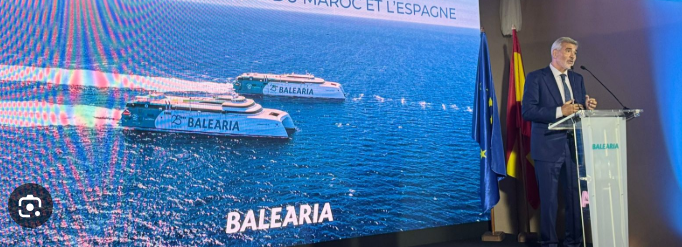Earlier this week at Tangier City Port, Spanish maritime company Baleària unveiled the project for the first green corridor between Spain and Morocco, to be operated by two 100% electric, zero-emission fast ferries built in Spain and expected to enter service in 2027.
These twin vessels will serve the Tangier City–Tarifa route, which Baleària has been operating with conventional fast ferries since May, after winning the public tender issued by the Port Authority of the Bay of Algeciras (APBA) in late 2024 to run the line for the next 15 years.
The launch ceremony — billed as the most sustainable link between Europe and Africa — gathered around 200 attendees, including numerous institutional representatives: Morocco’s Minister of Transport and Logistics Abdessamad Kayouh, Spain’s Ambassador to Morocco Enrique Ojeda, APBA President Gerardo Landaluce, President of Tangier City Port Mohamed Ouanaya, Spain’s Secretary General for Maritime and Air Transport Benito Nuñez, and Omar Moro, President of the Tangier-Tetouan-Al Hoceima Regional Council, among other officials.
Baleària President Adolfo Utor described the link as “a green umbilical cord uniting two nations with deep historical, cultural, economic, and commercial ties.” He emphasized the project’s pioneering public-private partnership and advanced technology:
“This will allow us to complete the entire crossing using only electric energy — for the first time — generating zero emissions.”
Once operational, the new ferries will prevent the emission of 44,000 tonnes of CO₂ equivalent annually.
Baleària’s Managing Director Georges Bassoul elaborated on the project’s technical specifications:
- The two catamarans will be built by Armon shipyards in Spain.
- Each vessel will feature 16 MW of electric power from four electric thrusters, powered by 11,500 kWh battery capacity, enabling the full 18-nautical-mile crossing with zero emissions.
- The project also includes contributions from major engineering and energy firms like Cotenaval, Endesa, Amendis, and Incat Crowther.
“These will be fully decarbonized crossings, meeting 2050 climate targets by 2027,” Bassoul said. He also highlighted that electric propulsion eliminates not only emissions but also noise and vibration.
Each vessel will also have four backup diesel generators totaling 11,200 kW, designed for emergency use only.
Battery recharging will occur during the one-hour layover in each port. To support this, each port will be equipped with:
- 8 MWh of stationary battery storage
- Onshore power supply of 5 MW in Tarifa and 8 MW in Tangier
- Two autonomous robotic arms per port, using the Onshore Power System (OPS), to connect to the vessels.
“This cutting-edge system will allow us to recharge the batteries needed for the crossing in just 40 minutes,” said Bassoul.
The combined onboard and onshore storage capacity will total 39 MWh, equivalent to the battery capacity of around 765 electric cars.
A Leader in Eco-Efficient Maritime Transport
Baleària is committed to a strategy of deploying smart, eco-efficient vessels, and is actively involved in projects focused on future energy solutions in pursuit of net-zero emissions by 2050.
- The company currently operates a fleet of 11 LNG-powered vessels,
- And has pioneered the use of electric propulsion, adding two electric ships to its fleet since 2023.
- Thanks to these innovations and efficiency measures, Baleària reduced its carbon footprint per passenger by nearly 10% in 2024.




